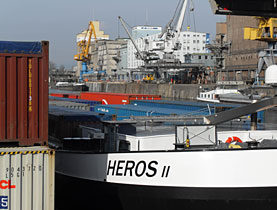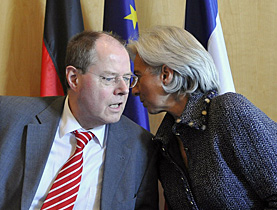Political spat threatens German trade boom

The recent war of words between Swiss and German politicians could have a negative effect on bilateral trade, according to concerned business leaders.
The two countries enjoyed a bumper year of trade in 2008, but the economic recession coupled with an escalating row over tax evasion has already put a brake on soaring exports and imports.
Last year, Germany underlined its status as Switzerland’s most important trading partner by sending 4.3 per cent more goods and services across the border – totalling €42.6 billion (SFr65 billion). In return, Switzerland exported about €27.5 billion (SFr42 billion) to Germany – up 1.6 per cent.
However, the sharp economic downturn has caught up with both countries, with the trade volume shrinking by around a fifth in the first two months of 2009.
Eric Sarasin, president of the Swiss-German Chamber of Commerce, fears an ongoing row between the two countries on the issue of tax evasion would further dampen business relations if it escalates into a round of retaliatory measures.
Tax row
Sarasin appealed for a de-escalation in the war of words. “A long-term economic downturn cannot be ruled out completely if the overall atmosphere is heated up through these polemical comments,” he said in Zurich on Monday.
Germany is at the forefront of an international campaign to clamp down on tax havens, with Switzerland set firmly in its sights. German Finance Minister Peer Steinbrück has aimed frequent tirades at Switzerland, accusing the country of harbouring the cash of German tax cheats.
Germany is currently debating a draft law that would place restrictions on foreign companies that do not comply with Organisation for Cooperation and Development (OECD) tax rules.
Such a law would bog down non-OECD compliant companies or individuals with the burden of supplying extra accounting information to the German authorities. Ultimately a firm could end up penalised financially, but Sarasin was hopeful that the Bill would not pass into law.
Separate to the tax evasion row, Switzerland has recently introduced regulations to combat wage dumping to complement a recent referendum that extended open borders to European Union workers.
Excellent trade relations
Basel Country is the only canton so far to apply the rule that obliges small EU firms to put up a security of SFr20,000 if they undertake work in Switzerland to the value of at least SFr2,000 that lasts less than 90 days.
Part or all of the security, which could later be demanded by other cantons, could then be taken away if such firms are found guilty and consequently fined for wage dumping.
Despite the potential economic and political difficulties lying in wait, the Chamber of Commerce expected trade to stabilise by the end of the year and finish no lower than ten per cent below 2008 levels.
Director Ralf Bopp stressed the “excellent and close relations between manufacturers, suppliers and traders” – those caught in the middle of the ongoing row.
swissinfo, based on an article in German by Alexander Künzle in Zurich
Germany is Switzerland’s largest single market for exported goods, representing about 20% of all Swiss goods and services sent abroad.
German imports make up 34.6% of all imports arriving in Switzerland – by far the largest supplier. Italy is the next largest importer into Switzerland, making up 11.4% of the total.
From a German perspective, 4% of all its exports head across the Swiss border, making Switzerland Germany’s tenth most important market.
In addition to the trade of goods and services, Switzerland is the sixth biggest direct investor in Germany while German direct investment in Switzerland ranks the fifth highest of all countries.
Last year, the number of Germans coming to live in Switzerland rose 15.6% to a record 233,000. Germans now make up 14% of the foreign population in Switzerland.
In contrast, the number of Swiss going to live in Germany slowed to a trickle in 2008, with only 400 choosing to join their 75,000 compatriots north of the border.
The tourist trade between the two countries also flourished last year. Germany is the most popular destination for Swiss visitors, registering some 3.7 million overnight stays in 2008 (up 2.2% from 2007).
German tourists to Switzerland notched up 6.3 million overnight stays – a rise of 3.8% – the highest proportion of all visitors.

In compliance with the JTI standards
More: SWI swissinfo.ch certified by the Journalism Trust Initiative











You can find an overview of ongoing debates with our journalists here . Please join us!
If you want to start a conversation about a topic raised in this article or want to report factual errors, email us at english@swissinfo.ch.